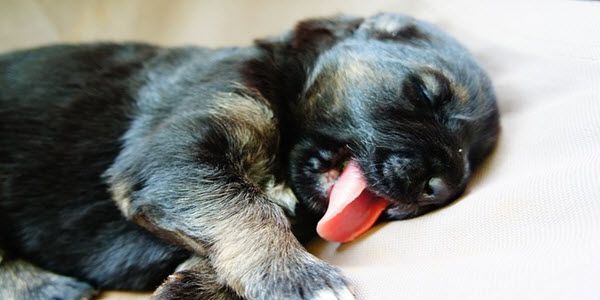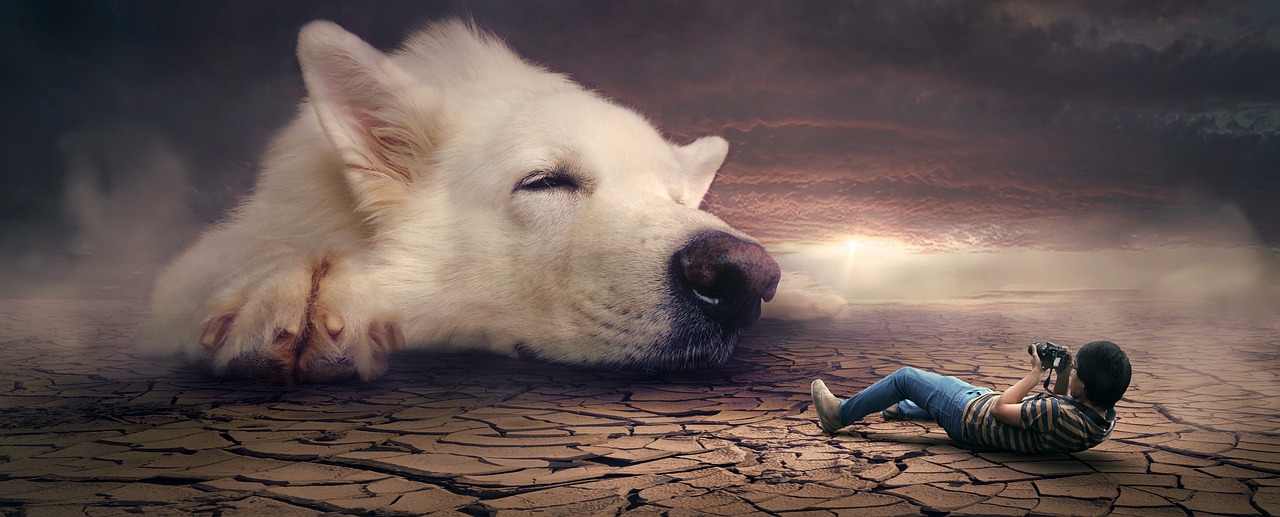Every dog owner has every reason to get worried when his dog pees in his sleep.
Although peeing while sleeping is quite common in dogs (especially among puppies and older dogs), it can indicate severe underlying issues if the habit reoccurs.
For instance, one of the most common reasons why dogs wet their bed in their sleep is incontinence. For starters, this is a situation where a dog passes urine while completely unaware that he is doing so.
Most cases of urinary incontinence are due to sphincter mechanism inefficiencies, which simply means that the neck of a dog’s urinary bladder is considerably weak to retain or hold urine inside.
And sphincter mechanism inefficiencies have several causes, including urinary tract infections, kidney diseases, diabetes, spinal cord injury, prostrate disorders, neutering incontinence in older dogs, and bladder stones among others.
Age may also affect the ability of a dog to effectively control his urinary bladder though it is not always the case as puppies also experience the issue as well.
Nevertheless, not all instances when a dog pees in his sleep suggest that they have urinary incontinence or an underlying health condition.
At times, it might be because he is experiencing nightmares.
So, Can Nightmares Be The Reason Why My Dog Is Peeing In His Sleep?

The short answer is YES. Dogs can have both normal and bad dreams and pee in their sleep because of such dreams.
A dog having ‘nice’ dreams and nightmares (bad dreams)…then wetting his bed in either case? Real or Fiction?
Well, it is real! Dogs do dream and have nightmares…
Let’s begin with normal dreams.
The brains of our canine friends have a lot of similarities to ours (humans). Consequently, our dog’s brain waves tend to go through the same stages of activity when we are asleep.
Because we mostly dream about our past memories, there are high chances that dogs also dream about their memories.
Dogs also dream to process some of the emotions and activities that they might have encountered during the day.
Think of doggie activities like hunting, playing fetch, chasing, feasting on his favorable treats, etc. A dog may dream about all these with some dreams involving ‘peeing’ or release of the urinary tract.
Let’s now focus on the scary stuff—nightmares. Can dogs also have nightmares? Can they have nightmares and pee?
First, dogs can have nightmares just like humans if findings by Stanley Coren, a professor at the University of Columbia’s Psychology Department are anything to go by.
But nightmares about what?
Corens says just the day-to-day doggie things. According to this professor, dog nightmares often revolve around things that they fear—just like humans.
However, our canine friends’ brains are not that sophisticated (compared to ours), so they are not so good at imagining possible scenarios.
Consequently, their nightmares are more connected to their real past experiences or memories.
Think of things that they don’t like or which give them anxiety like fighting with another dog, frightening experiences at the vet, toenail clipping sessions, and scary training sessions. If you recently rescued him, he may also have nightmares of his pre-rescue life.
Whatever the scary event your dog is dreaming about, he will show it through body movements (like twitching eyes and paws, shaking while sleeping, etc) and sounds related to the distress (like growling, whining, whimpering, creaming, barking, etc).
This great video may shed some light on how nightmares in dogs may occur:
Like normal dreams, any of these bad dreams may involve the release of the urinary tract. In other words, your dog may not have full control of his bladder while he is experiencing nightmares, making him wet his bed as a result.
That’s why it is not uncommon to hear a dog scream in the middle of his sleep, only to find out he has peed on his bed while he is still dead asleep.
And if you’ve experienced this, know that you are not alone. Many dog parents have reported noticing a puddle of urine on their dogs’ beddings shortly after their furry friends showed all signs of having a nightmare.
BUT…
Cases of dogs having nightmares and peeing can only happen a few times. So, always consider it as an accident and not a long-term problem.
What to Do When Your Dog Is Experiencing Nightmares And Peeing

I. Don’t Wake Him Up
While it can be tempting to wake your canine friend and save him from “traumas” in his dreams, it is never a good idea—for several valid reasons.
First, a dog experiencing a scary dream may not know where he is right away and could impulsively bite you out of fear.
Secondly, you will be disrupting your pup’s sleep cycle, which is not recommended.
Instead, do the following:
- Keep some distance between you and your dog. This will keep everybody safe and comfortable in case he wakes up and lushes at you violently.
- If you have to wake him (for instance, if he’s having his business at the wrong spot), then call out his name gently.
- If he doesn’t wake up, consider raising your voice progressively. In most cases, he will wake up unless he was experiencing a seizure. Learn more here: How to Tell If a Dog Is Having a Seizure While Sleeping
- Once he wakes up, speak to him in a reassuring voice to calm him down.
II. Create a Soothing Environment for Snoozing
As aforementioned, cases of a dog having nightmares and peeing are not common—and can be considered to be mere accidents.
However, if your dog has frequent nightmares (even if it is not accompanied by bed wetting), consider making his sleeping environment more relaxed:
- Get him a calming bed. Here are the best options: 12 Best Calming Dog Beds in 2022
- Play him quiet music like classical music. By the way, Do Dogs Like Classical Music?
- Get him an anxiety collar. Sentry Calming Collar is the best in the market right now.
- Anxiety jackets can also come in handy. Thundershirt Classical Jacket is the most popular right now.
- Get your dog an anxiety supplement to keep him calm and boost his relaxation at night. Vetri science Laboratories’ Composure is the best option for both dogs and cats right now.
- Finally, invest in doggie diapers to keep everything around him dry in case he loses control of his bladder during one of his nightmare episodes. Check out these posts for the best options: 12 Best Dog Diapers for Male Dogs and
10 Best Dog Diapers for Periods
III. Take a trip to the Vet
As we have mentioned, a dog having nightmares and peeing is a mere accident and shouldn’t be a cause for concern.
If anything, your dog will forget it once he wakes up and move on with his normal life.
However, if it becomes a frequent occurrence, it is advisable to consult a veterinarian.
A vet will help you establish the underlying issue behind the behavior and help your pup get a good night’s sleep.
While the release of the urinary tract during your dog’s night terrors by itself is not deadly, when it is paired with underlying conditions like kidney diseases and diabetes, it can be fatal if it is not addressed on time.
If possible, seek the services of an animal behaviorist as well to help you address the root cause of your pup’s fears. A behaviorist can also help your canine friend have a consistent good night’s rest.
Final Thoughts
Although you cannot talk to your dog to figure out the exact thing that’s terrorizing his night to an extent that he wets his bed, it is safe to assume that his memories are the culprit—at least thanks to scientific research.
Thankfully, there are things that you can do in case you witness such incidences.
We hope that you will find a solution for your Fido if you implement some of the tips we have highlighted in this post as well as what your veterinarian or animal behaviorist will recommend.
Related Posts:
What Do Dogs Think About When They Are Alone?
When A Dog Howls, Does It Mean Death?
8 Best Fire Hydrants for Dogs to Pee On
How Long Can a Small Dog Hold Its Bladder Overnight?
As an Amazon Associate, we may receive a small commission from qualifying purchases but at no extra cost to you. Learn more. Amazon and the Amazon logo are trademarks of Amazon.com, Inc, or its affiliates.

